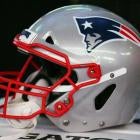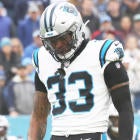This weekend in college football is highlighted by the 117th Army-Navy game, set for 3 p.m. ET at M&T Bank Stadium and airing exclusively on CBS and CBSSports.com. Navy is currently carrying the series' longest win streak (14), but Army enters the game with a winning record for the first time since 2010. Before breaking down the storylines and players to watch for this year's contest, we're taking a look back at some great moments in Army-Navy history.
Date: Dec. 8, 2012
Outcome: Navy 17, Army 13
Coming clean is a good policy here. There's so much about the history of Army-Navy that I wouldn't be able to explain even if I wanted. I couldn't tell you about the great Roger Staubach. I couldn't possibly describe how dominant Army was in the peak years of the Earl Blaik era of the 1940s when Doc Blanchard and Glenn Davis were winning the Heisman Trophy.
I could recite a summary, but I couldn't take you there.
But I can tell you about Army quarterback Trent Steelman and how watching him play Navy in 2012 will stay with me for the rest of my life.
The last time Army beat Navy was in 2001 (26-17), and it had already been a decade of misery for the Black Knights by the time the two academies met in 2012. Army had suffered through 10 consecutive losses to the Midshipmen, nine by double digits. It came close the year before when it was tied with Navy at 21 entering the fourth quarter but relinquished two field goals while failing to score again.
Army fell behind twice in the first half in 2012, but matched Navy touchdown for touchdown and field goal for field goal for a 10-10 tie at halftime. The Black Knights tacked on another field goal to take a 13-10 lead heading into the fourth quarter but a missed 37-yard field goal with seven minutes left altered the course of a tight game. Navy quarterback Keenan Reynolds did Keenan Reynolds things on the ensuing seven-play, 80-yard touchdown drive that put his team up 17-13 with under five minutes remaining.
Steelman had one more turn. Four straight rushes put Army near midfield when he completed two consecutive passes to Chevaughn Lawrence for 25 yards that put the Black Knights on the cusp of field goal range with two minutes remaining. Had Army not missed its previous field goal, it would have needed just three points to win. Instead, it needed 28 more yards. The Cadets got all the way inside the 15-yard line when a bad exchange between Steelman and fullback Larry Dixon put the ball on the ground. Steelman dove for it in one last gasp for a chance, but it was too late. Navy recovered. Game over.
Steelman played well all game. The senior finished 4-of-5 passing and led a triple option attack that lapped Navy in the rushing department (370 yards to 167 yards), accounting for 96 yards on the ground and a score himself. For four years, Steelman and his teammates worked towards this one moment. But in the chaos of a potential game-winning drive, a simple miscommunication undid it all.
It was just a mistake, nothing more, but football can be cruel and unfair. There are no guarantees no matter how much work, sweat and blood is paid.
Steelman made his way to the sideline and was noticeably crying. Color commentator Gary Danielson said, "I'm not even going to pretend I know what he's going through." Steelman probably didn't fully know what he felt, either, but it was over for him. There were no more chances.
Then came the singing of the alma maters. By itself, the tradition is equal parts beautiful and haunting, like Gregorian chanting. The image of Steelman sobbing and inconsolable deepened its effect.
It was hard to watch and admittedly a little guilt-inducing. This wasn't a "great moment in Army-Navy history" that will be remembered by all for decades because of an incredible play on the field. It was, however, a gripping reminder of why the game still matters.
Our most honest moments usually come in despair, not ecstasy. Steelman's reaction showed in that precise moment what it looks like to care so deeply for something that you can't help but bare your soul. It was an inner-most vulnerability that goes against the tough-guy act football parades. He was a display of heart, even if the window was set up against his own will.
We should all care that deeply about something in our own lives even if it hurts from time to time. Otherwise, there'd be no reason to strap on our own pads.





















